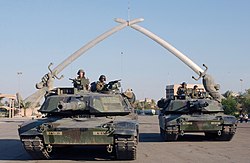This is a timeline of the events surrounding the United States-led invasion of Iraq in 2003.
Contents
- March 16
- March 17
- March 18
- March 19
- March 20
- March 22
- March 23
- March 24
- March 25
- March 26
- March 27
- March 28
- March 29
- March 31
- April 2
- April 3
- April 4
- April 6
- April 8
- April 9
- April 11
- April 12
- April 13
- April 15
- May 1
- See also
- References
- External links






